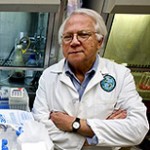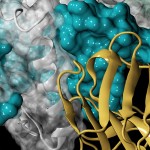
Erica Ollmann Saphire, Ph.D.
Viral Hemorrhagic Fever Immunotherapeutic Consortium Director, Professor of Immunology and Microbial Science, Professor of Integrative Structural and Computational Biology, The Scripps Research Institute - La Jolla, California, USA
Erica Ollmann Saphire studies viruses with compact genomes of only 4-7 genes (Ebola and Lassa viruses in particular). Consequently, each protein is critical, many are obligated to perform multiple functions, and some actually rearrange their structures to achieve those new functions. As a result, these few polypeptides accomplish a surprisingly complex set of biological functions: immune evasion, receptor recognition, cell entry, transcription, translation, assembly and exit. Viruses with limited genomes also offer a well-defined landscape of possible protein-protein interactions, which together comprise the totality of their life cycle. By systematically analyzing the structures and functions of each protein the virus encodes, the Ollmann Saphire lab has discovered fundamental insights into the biology of entry, immune evasion, and assembly, and has deciphered the collaborative roles of these proteins in pathogenesis.


















